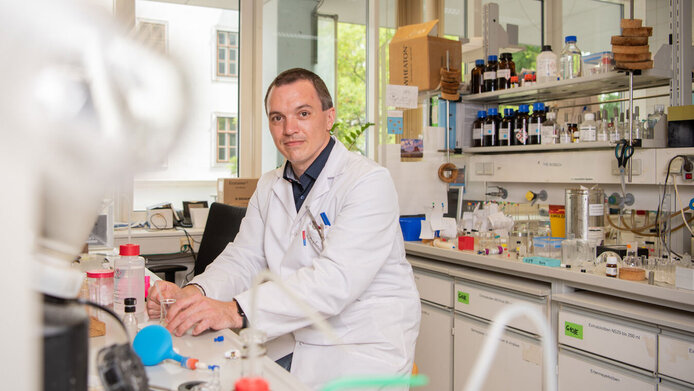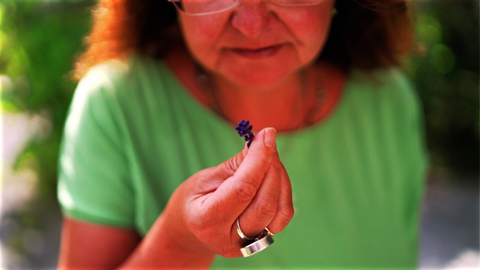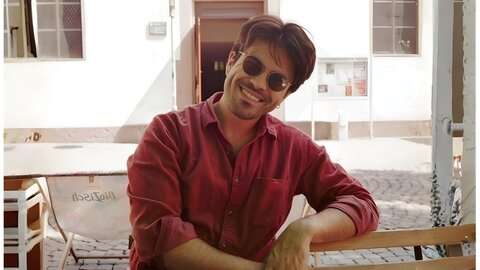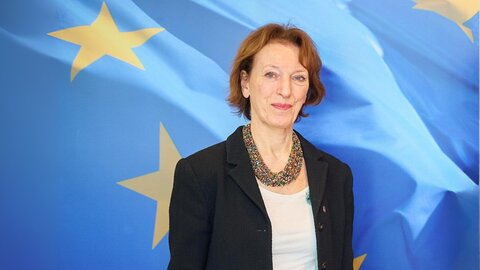Taking the antibody taxi right into the cancer cell

What is your START project about?
Hannes Mikula: In most cases, the active substances used in classical chemotherapy are poison more than they are medicine. Since they do not only attack cancer cells, they have serious side effects. The problem is not that tumour cells can’t be killed, but that healthy cells are also destroyed in the process.
How do you want to solve this?
Mikula: A newer strategy is already being used in clinical practice: the active substances are sent to the tumour in a “molecular taxi”. A molecule serves as a shuttle in the most focused and targeted way possible. Owing to the pandemic, one of the classes of substances that is already being used is quite well known nowadays: antibodies.
Where does the antibody taxi go?
Mikula: Unfortunately, it often doesn’t end up where it is supposed to. And it's not one hundred per cent stable, either, which means the active ingredient is split off at the wrong place. The big problem is that we still can't control how molecules move in a cellular environment – this is something we want to achieve through chemical reactions. Usually it scares people off when you say you want to produce a chemical reaction in a human body. After all, chemistry is often associated with industry, unhealthy food, toxic gases and explosions. In order to be able to produce a chemical reaction safely and in a controlled manner in cells, it is all the more important for this molecular technology to be very sophisticated. The reaction has to occur at exactly the place and in exactly the way we want it to happen.
What are the difficulties?
Mikula: It isnot enough if the antibody binds to the cancer cell but the active substance does not end up directly in the cell. What happens on the last leg? How can we make sure, by means of a chemical reaction, that the substance is not being taken up by a healthy neighbouring cell? We want to steer molecules specifically into cancer cells, and we are trying to do this with the new concept of a chemical cascade.
What does that look like?
Mikula: Let's assume you are a member of the START/Wittgenstein jury and you come to Vienna for the hearing. When you land at the airport in Schwechat, you are not yet at the FWF offices. But you can take the train, the tram, a bus or the underground to get to your destination. This switch to local transport is what we want to develop at the molecular level to enable precise navigation of active substances.
You have described the cliché-ridden, deterring view of your discipline. What attracted you to chemistry yourself?
Mikula: My teacher at secondary school sparked my enthusiasm and my parents made it possible for me to attend the last five years of secondary school at a technical school in Vienna with a focus on chemistry. For five years I commuted almost two hours each way from Burgenland to Vienna every day. My form teacher gave me my first idea about TU Wien (the Vienna University of Technology) before the school-leaving exam; he was assisted by professors with whom I work today. So there were several people who gradually steered me to where I am today: a case of cascade targeting, if you like.
Which (historical) figure would you like to meet?
Mikula: For a long time I was unable to decide between chemistry and mathematics, so I started studying both. There was one scientist who managed to combine maths, chemistry and physics in one equation: Erwin Schrödinger.
The fellowship that took you abroad is named after him. Where did you go?
Mikula: I spent two years in Boston at the Center for Systems Biology, Massachusetts General Hospital at Harvard Medical School, where I really got into bioorthogonal chemistry. This translates roughly into chemistry being at a right angle to biology. Usually, when we chemists perform a reaction, it happens under controlled conditions, in a glass flask, for example. We control the temperature, use certain solvents, regulate the oxygen content and so forth. In living cells this is not possible, of course. In that case the chemical reaction has to be so selective and controlled that it remains unaffected by anything else going on around it. The first attempts in this direction have only recently been made.
When was that?
Mikula: It started around the turn of the millennium. And the things we are specifically working on are only about ten years old. We are developing chemical tools that enable the targeted cleavage of molecules in a biological environment. Recently, this has been tested for the first time in a clinical trial in the USA – the very first time that a bioorthogonal reaction has been produced in a human being.
What do you plan to do with the START Award?
Mikula: It iscrucial that you observe very closely everything you do. Especially when an experiment doesn't work out the way you originally thought it would. That situation often produces the greatest insights. The funding that comes with the START Award offers an incredible flexibility over a long period of time. You can concentrate on what you really want to implement and take your research a step further. So, it’s a starting signal! Now things are really getting started.
Hannes Mikula heads the “Molecular Chemistry & Chemical Biology” group at the Institute of Applied Synthetic Chemistry at TU Wien. His team focuses inter alia on the development of bioorthogonal tools. Mikula became acquainted with this interface between chemistry and biology during his postdoc stay at the Massachusetts General Hospital, Harvard Medical School, which was funded through a Schrödinger Fellowship awarded to him by the Austrian Science Fund FWF. In 2016, he returned to TU Wien, where he had completed his doctorate sub auspiciis in 2014.
About the project
Chemotherapy in the fight against cancer remains poorly targeted. It is not yet possible to control the movement of molecules in a cellular environment. In his project “Bioorthogonal Cascade-Targeting” Hannes Mikula intends to develop strategies to steer the active substance specifically into cancer cells. The molecular cascade targeting is intended to prevent the substance from also landing in healthy cells and destroying them.
The START Prize
The START Programme of the Austrian Science Fund FWF is aimed at outstanding young researchers, giving them the opportunity to plan their research over an extended period and with a high degree of financial security. It is endowed with up to EUR 1.2 million and is one of Austria’s most prestigious and most highly endowed awards alongside the Wittgenstein Award.





